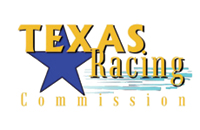|

|
 |
Anabolic Steroid Testing, Changes in
Allowable Toe Grabs Rule Underway
As of January 1, 2009, the Texas Racing Commission (TxRC) began testing horses racing in Texas for anabolic steroids under the Commission’s existing rule authority. As a result, horsemen should no longer administer anabolic steroids to any horse intended for competition. Also starting on January 1, the Commission instructed the racetrack associations to use House Rules to limit front toe grabs on Thoroughbred or Arabian horses to two millimeters and on Quarter Horses, Paint Horses, or Appaloosas to four millimeters. For a complete list of medication levels permissible in post-race samples for horses racing in Texas, click here. The Commission is undergoing the rule making process to adopt the Racing Commissioners’ International (RCI) model rule on anabolic steroid testing and a comprehensive rule to address limitations on toe grabs and other traction devices. The following rules were approved by the Commission at its December 2, 2008 meeting. After receiving public comment, the rules will be ready for final adoption in February of 2009. This schedule will allow the Commission to adopt specific threshold concentrations for anabolic steroids that would be consistent with study results and national uniform guidelines. It also will meet the Thoroughbred Owners and Breeders Association (TOBA) ’s recommended schedule for maintaining graded stakes races: Toe Grabs Rule: Texas Racing Commission Sec. 313.426. Toe Grabs Prohibited (b) A Quarter Horse, Paint Horse, or Appaloosa is ineligible to start in a race when it has shoes (racing plates) that have toe grabs with a height greater than four millimeters (0.15748 inches), bends, jar calks, stickers, or any other traction device on the front hooves. Androgenic-Anabolic Steroid Rule: Texas Racing Commission Sec. 319.364. Testing for Androgenic-Anabolic Steroids (2) Concentrations of these androgenic-anabolic steroids shall not exceed the following urine threshold concentrations for total (i.e., free drug or metabolite and drug or metabolite liberated from its conjugates):
(3) Any other anabolic steroids are prohibited in racing horses. (4) Post-race urine samples must have the sex of the horse identified to the laboratory. (5) Any horse to which an anabolic steroid has been administered in order to assist in the recovery from an illness or injury may be placed on the veterinarian's list in order to monitor the concentration of the drug or metabolite in urine. After the concentration has fallen below the designated threshold for the administered androgenic-anabolic steroids, the horse is eligible to be removed from the list. It is understood that the first 30-60 days of testing will be considered a launch period, during which time the Commission will be fully evaluating the test results and be cautious in calling positives. During the launch period, the Commission is most concerned with results that show an obvious disregard for the rules. Commission staff will use this opportunity to counsel owners and trainers and may issue warning letters about any marginal test results to promote full understanding and compliance with the new program. For significant or repetitive overages for horses owned or trained by the same individual, hearings may take place to address rule violations with appropriate penalties, including loss of purse, fines, and/or suspensions in keeping with a Class 4 drug violation. In order to give local horsemen at Retama Park, the only racetrack in Texas currently conducting live racing, some lead time to remove their horses from steroids, a horsemen’s meeting took place at Retama Park on November 6, 2008 at which time the TxRC’s director of racing, John Ferrara, answered questions and confirmed plans leading to the January 1, 2009 start of testing. According to Charla Ann King, Executive Director of the Texas Racing Commission, the Commission has been studying the use and impact of anabolic steroids on racehorses through its Safety and Medication Working Group. In coordination with the industry, the Commission has conducted an anabolic steroid study based on 40 on-track horses in training. The results of this study as well as other states studies are pending. Further modifications and refinements to the RCI model rule on anabolic steroid testing may be proposed based on the results of these studies. The proposed new rules have been published in The Texas Register. Comments on the proposed new rule may be submitted to Carolyn Weiss, assistant to the Executive Director of the Texas Racing Commission, at P. O. Box 12080, Austin, TX 78711-2080, by phoning (512) 833-6699 or faxing (512) 833-6907 no later than January 18. The TxRC will consider adoption of the rules at its February 3 meeting. |
| Back to News |
BENEVOLENCE | BENEFITS | GROOM ELITE | PERSONNEL | LINKS | CONTACT US
